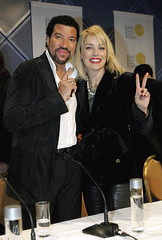Remember in class today when we were talking about how modesty is something you have to consider when you're out and about as a Rev.? Modesty in attire and in expression?
PeaceBang has been thinking about that tonight (because she's obviously not writing her paper or her exam now, IS SHE?), and she has gotten a bit stuck on the notion of modesty. The reason for that is that PeaceBang isn't exactly the modest type. PeaceBang isn't at all modest, if you'd like to know God's own truth. She is actually a big-mouthed sassy broad, and having made it through ten happy and good years in ministry, she must conclude that personal modesty is not absolutely key in surviving the parish with your good name and vocational integrity intact.
And yet she herself used the word "modesty" today in class, which bears some explaining.
Ministerial modesty in dress and in personal sharing isn't about maintaining some faux primness about yourself, as though you were a Victorian-era lady who might need to be revived by smelling salts at the sight of a bare ankle.
That isn't what PeaceBang means.
Ministerial modesty is more about maintaining a modicum of personal privacy around yourself as a way to respect the fact that so much of your heart and soul belongs to your church,
you've got to keep some of yourself to yourself.
This can be a win-win. On one hand, you need privacy. Putting care and intention into your appearance helps prepare you for public consumption, for lack of a better word. It establishes a boundary:
This is my private life, this is my public life. On the other hand, when your people look at you, they want to see you but they also want to see the best of themselves in you. If you have too much leg showing or dirt caked in the treads of your Timberlands, they can't do that.
We talk a lot about appropriate sexual boundaries in the church, and about boundaries in general. And we should. We need to. Ministry is a terribly, awesomely intimate business. Not only do we share the spiritual and emotional lives of our parishioners, we share their incarnational struggles. They are of one piece.
We don't think of this very often, but the truth is, we minister to our people body and soul. We visit with them, we hold their hands, we anxiously await test results together, we help them sit up in bed, we sometimes feed them soup or Jell-O. We hold the baby while they move their C-section-sore bodies to the bathroom and back. We anoint them before death, we wipe tears, and sweat, from their faces. We smoothe their hair, and sometimes brush it. We gently pull covers over them when we know they feel too exposed to our gaze. We clear their snotty tissues and half-drunk cups of juice off that tiny stupid hospital bed table so we have somewhere to put our Bible. We keep hand sanitizer in our car, our office, and in our purses and briefcases because we minister to bodies, not disembodied spirits.
In this work, it is only natural and right that we should be carefully put together, buttoned up, tucked in, clean and pressed and combed. So many of our pastoral duties place us in the presence of the fragility of the human body -- its trembling vulnerability, its amazing ability to heal and overcome trauma and disease, and its shocking and sudden betrayals. It is only natural and right that we should want to be beautiful and whole in body and appearance as a sign and symbol of our belief in the beauty and wholeness potential in the human condition.
I guess what I am trying to say is that in some way, our ministerial bodies are not just personal but are also communal. This may be neither rational nor fair, chickens, but that's just how it is. When one of our beloveds is dying, it's not just anybody who shows up who can represent the church. It's when your particular body shows up that the Church is there at bedside. You know, I know it and God knows it. When you become a "Rev.," your body isn't just your body anymore. Maybe not fair or rational, but I think that's how it works.
I wonder if some of our extreme acting out in the physical sense (alcohol addiction, compulsive overeating, sexual abuse, etc.) isn't an unconscious rebellion against this felt truth.
I figure it this way: only God knows the condition of my soul. My people know what they see, hear, and feel in me. We are all body beings and all we know is the information we get from being bodies together. There's no reason to want to rebel against that. In fact, we should dress up for it every day! With lipstick and heels, or a suit and tie even sometimes!
In private, it doesn't matter if my family or my intimates see too much bosom or leg, or chipped nail polish or graying hair or spinach in my teeth or flab cheerfully emerging from the top of my bathing suit.
In a ministerial context, however, these things are inappropriate distractions. They're not inherently sinful or harmful in and of themselves -- of course not, for heaven's sweet sake! But they are evidence of a kind of unpreparedness, a kind of refusal to rise to the occasion of what the Church is trying to represent, and a staunch denial that the minister's body represents, on some level, the gathered body.
Simply this: They should be able to see the best of themselves in you. When you walk out the door, be prepared to meet this expectation not only in your heart, but in your physical presence.
If you're not ready for that, get ready. Vestments and a collar is the very least of it, chickens.
Labels: Seminarian Advice, Theological Reflection On Your Fabulousness



